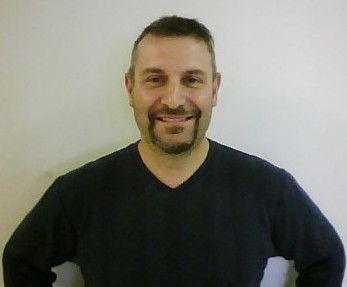
![]()
On the Job
 |
| Paul Fraccalvieri |
Name: Paul Fraccalvieri
How many years have you been teaching?
I have been teaching ten years in the field more or less.
What was your first job in the field?
My first job in the field was a position in the SPELL Program at Hunter College while pursuing my M.A. in TESOL. Following graduation, I had stints in both Xian, China and then Casablanca, Morocco before coming back stateside.
Current positions:
-Adjunct Lecturer in The English Learning Center at LaGuardia Community College, CUNY, Queens, New York
-Continuing Ed Instructor at Baruch College, Department of Continuing and Professional Studies
-Freelance Test Preparation Tutor
What courses do you teach?
TOEFL Prep, Listening and Speaking, and Vocabulary Acquisition. I also tutor in the Language Clinic at LaGuardia Community College.
Why does the adjunct life work for you?
I like the flexibility that an adjunct position affords me. I have myriad interests that I enjoy pursuing such as theatre and music. A 9-5 type gig would prove too burdensome. Plus, I’m not really the kind of person who relishes sitting behind a desk. I like to be on the move. I’ve really always had a mosaic lifestyle where I’ve dabbled in many things at one time. When one area grows tiresome, I have the other job and a different group of people to look forward to.
What are some of the cons about being an adjunct?
It would be nice to have a paid vacation every now and then. Also, you have to really learn how to budget your money accordingly since numerous language programs tend to have long breaks between semesters.
What are some ways you recommend to keep gainfully employed?
These are three things to bear in mind:
- Be open to change and learning new things.
- Be a team player and extend yourself to others. If you have a problem, offer a solution not just the complaint.
- Be passionate about what you do; show your director your skills and abilities and work them into your teaching and extra-curricular activities.
What tips do you have for those who are looking for a job?
When interviewing for a position, be sure to talk specifics about the impact that you can personally make on the language program you’re applying to. How are you exceptional and what can you offer that your competitors cannot? Also, think about the interests of the students whom you serve. What topics, trends, and discussions will engage them and promote active learning? Be on the cutting edge.
I noticed several years ago that test preparation was an area that was burgeoning yet underserved in terms of skilled approaches of how to teach it. I was fortunate that my director gave me the carte blanche to develop a curriculum that has been successful. Seek out opportunities such as these.
What has been a rewarding experience for you in the classroom?
The fact that my students in TOEFL are entrusting me with preparing them for one of the most important exams of their educational careers. I am truly humbled by this. I have had innumerable students over the years who have increased their scores on the exam by 20-40 points. My students are a constant source of inspiration to me, and others through their success stories. I always remind them to think of the others who have sat in the same chairs and have gone on to do great things in their careers. I encourage them to allow those individuals to be the source of their motivation to achieve and overcome.
What challenges have you faced?
That students want too much, too soon. There’s very much a delayed gratification process in learning a language, yet our current generation is more impatient than ever. Also, learning a language is a very individualized entity. I tell my students not to compare themselves to others, but against themselves. If they feel that they’re making progress, that is all that matters. I always tell students that until I have perfected the micro-chip that allows them to speak English fluently and me to retire to Bermuda, we’ve got to do it the hard way.
